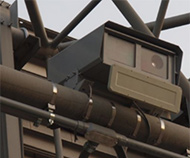7/7/2015
Federal Judge Backs Iowa Speed CamerasUs district court judge tosses class action lawsuit filed against photo radar in Cedar Rapids, Iowa.

A federal judge on Thursday decided not to allow the case against Iowa's speed cameras to be heard by a jury. After hundreds of pages of legal briefs were filed over the course of ten months, US District Court Judge Linda R. Reade dismissed the class action case that motorists had filed in state court against the city of Cedar Rapids and Gatso, the Dutch company that owns and operates the cameras. The drivers, she argued, failed to meet the requirements needed to bring such a case.
The lead plaintiff in the case, Gary Hughes, did not actually receive a speed camera ticket. Instead, he filed suit claiming a general harm to "his and every citizen's interest in proper application of the Constitution and laws." The judge was not impressed.
"Such a claim does not state an Article III case or controversy," Judge Reade ruled, citing the US Constitution. "In addition, the court finds that Gary Hughes does not have standing to pursue his claims under an Iowa rule that allows Iowa courts to render declaratory judgments."
Iowa Supreme Court precedent forbids judges from considering an "abstract question" merely to resolve an interesting point of law. Other participants in the lawsuit had received citations and paid them. David Mazgaj was behind the wheel of his wife's car when it generated a speeding citation, but he was not the right person to sign on to the lawsuit since the ticket was issued in his wife's name.
"Here, David Mazgaj fails to show that his wife has some hindrance that prevents her from protecting her own interests," Judge Reade ruled. "If she believes that she has suffered a constitutional injury, nothing prevents her from suing on her own behalf."
Only the claim of Roger L. Lee and three fellow motorists met the requirements for standing, since Lee posted a $125 bond and paid $185 for the right to appeal his $75 photo radar citation. This established the harm done to him, but that did not matter because Judge Reade found the case failed to meet the high bar of proving that there was no "rational basis" for the ticketing system in Cedar Rapids.
"The right to travel is a fundamental right recognized by the Supreme Court," Judge Reade wrote. "Defendants' conduct has not imposed an obstacle to out-of-state residents' entry into Iowa and therefore the automated traffic enforcement system does not directly impair the exercise of the right to free interstate movement... The city could rationally conclude that the automated traffic enforcement system would reduce the number of people violating traffic laws while simultaneously raising money."
The judge was also unmoved by the failure of Cedar Rapids to abide by the speed camera rules established by the Iowa Department of Transportation. Judge Reade deemed due process satisfied because a case could be appealed through the state courts.
A copy of the decision is available in a 300k PDF file at the source link below.


